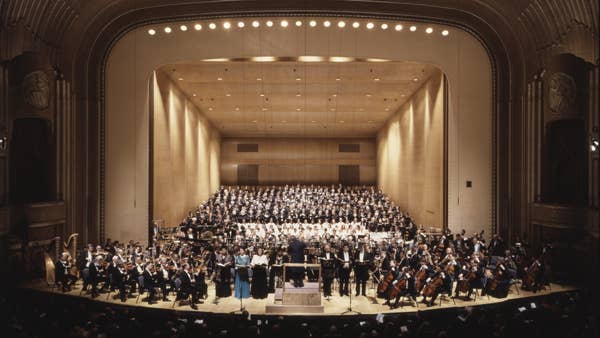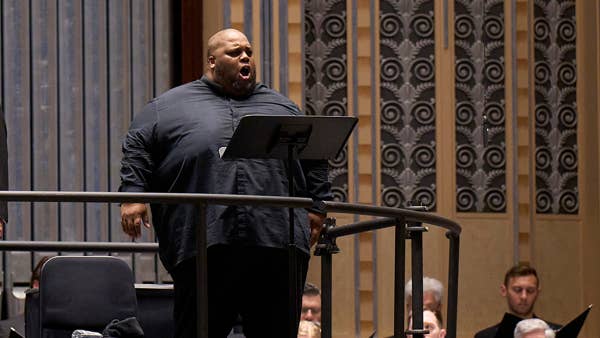A Conversation with Limmie Pulliam
In early September, we had a chance to sit down with tenor Limmie Pulliam, who will join the Orchestra for Mahler’s Das Lied von der Erde (The Song of the Earth) on October 2 & 5. He shared stories from his long relationship with The Cleveland Orchestra, insights into his preparation process, and thoughts on Mahler.

We’re so excited to welcome you back to Cleveland! What was your first experience with The Cleveland Orchestra, and what has it been like singing with them?
Each opportunity I’ve had to perform in Cleveland has been an unforgettable, moving experience. To call it a dream come true would still be an understatement. My first exposure to The Cleveland Orchestra was as an undergrad on Oberlin’s campus, and I still remember the first time I saw them in Severance — it was in 1996 and featured Frederica von Stade singing Berlioz’s Les Nuits d’été.
But my first time singing with The Cleveland Orchestra actually came the year before that, when the Oberlin College Choir had the opportunity to perform Mahler’s Eighth Symphony with the Orchestra and the great Robert Shaw conducting. After performances with The Cleveland Orchestra Chorus at Severance, we joined the Atlanta Symphony Orchestra Chorus, Cincinnati May Festival Chorus, and American Boychoir for a performance at Carnegie Hall. It truly was a “Symphony of a Thousand.” To this day, that is still my most moving musical experience. My friends from Oberlin and I still reminisce about it.

What was your first experience with Das Lied von der Erde? When did you first perform it?
My first exposure to Das Lied von der Erde was in college. I remember listening to a recording with Fritz Wunderlich singing the tenor part. It was thrilling to hear a voice like his, especially in the first movement.
My first opportunity to sing it was supposed to be last season with The Cleveland Orchestra, but it was postponed to this season. So, these concerts will mark my official debut in this work. I’m looking forward to reuniting with this great orchestra under the direction of Franz Welser-Möst.
Is there anything unique to your preparation for this piece, as opposed to an opera role?
My preparation is very similar to many of the operas I sing, in that the roles for my voice type often call for two different tenors. There is the tenor that has enough weight and heft to cut through the orchestra and deliver those loud, dramatic moments, but there is also the lyrical tenor for those softer and more fluid moments.
Both types of singing exist in Das Lied. It’s a wonderful challenge to keep the voice flexible and moving for that duality — the drama as well as the lyricism.

Do you have a favorite movement to sing, or a particular moment that really sticks out to you?
The first movement is like jumping into the deep end — there’s no time to warm up, you’d better be ready! When I found out I was doing this piece, I reached out to a colleague who has sung it quite a bit. His advice was: “In the first orchestra rehearsal, don’t sing as loud as you can. Just sing it comfortably. That way, the orchestra enters at a reasonable level.” Everyone is going to be excited, and the adrenaline is going to be pumping, but my job is not to feed into it by trying to compete with them.
The entire work is a joy to sing. I love the way Mahler uses orchestral colors to create dynamics, going from a fortississimo to a pianississimo and everything in between. I have to say my favorite part is singing the word Lebens (life) in the first movement — I start on a long, high B-flat and then “melt” down. It’s absolutely thrilling.
For those who may not be familiar with Mahler’s music or with this piece, can you offer some things to listen for?
Das Lied is so special because it combines a symphony with a song cycle. I often wonder what Mahler would have created if he had written an opera, since he wrote so well for the voice, and this may be as close as we get. I would say enjoy the lush orchestration, but also listen for how Mahler uses the voice.
There’s also a recurring word: ewig (forever). It comes up throughout, and the whole piece ends with the baritone repeating ewig, ewig, as the music fades out. At the time, Mahler was dealing with deep personal losses and facing his own mortality, so he took translations of Chinese poems and created what he thought was the most personal piece he had ever written.
Any final thoughts?
I’m just excited to reunite with friends and Iurii Samoilov, and to have two wonderful evenings of music with the Cleveland audience. To have the privilege of singing with this orchestra on multiple occasions has been one of the greatest joys of my life. Each time I return, it feels like coming home, and I hope to be able to continue this relationship for many years to come.